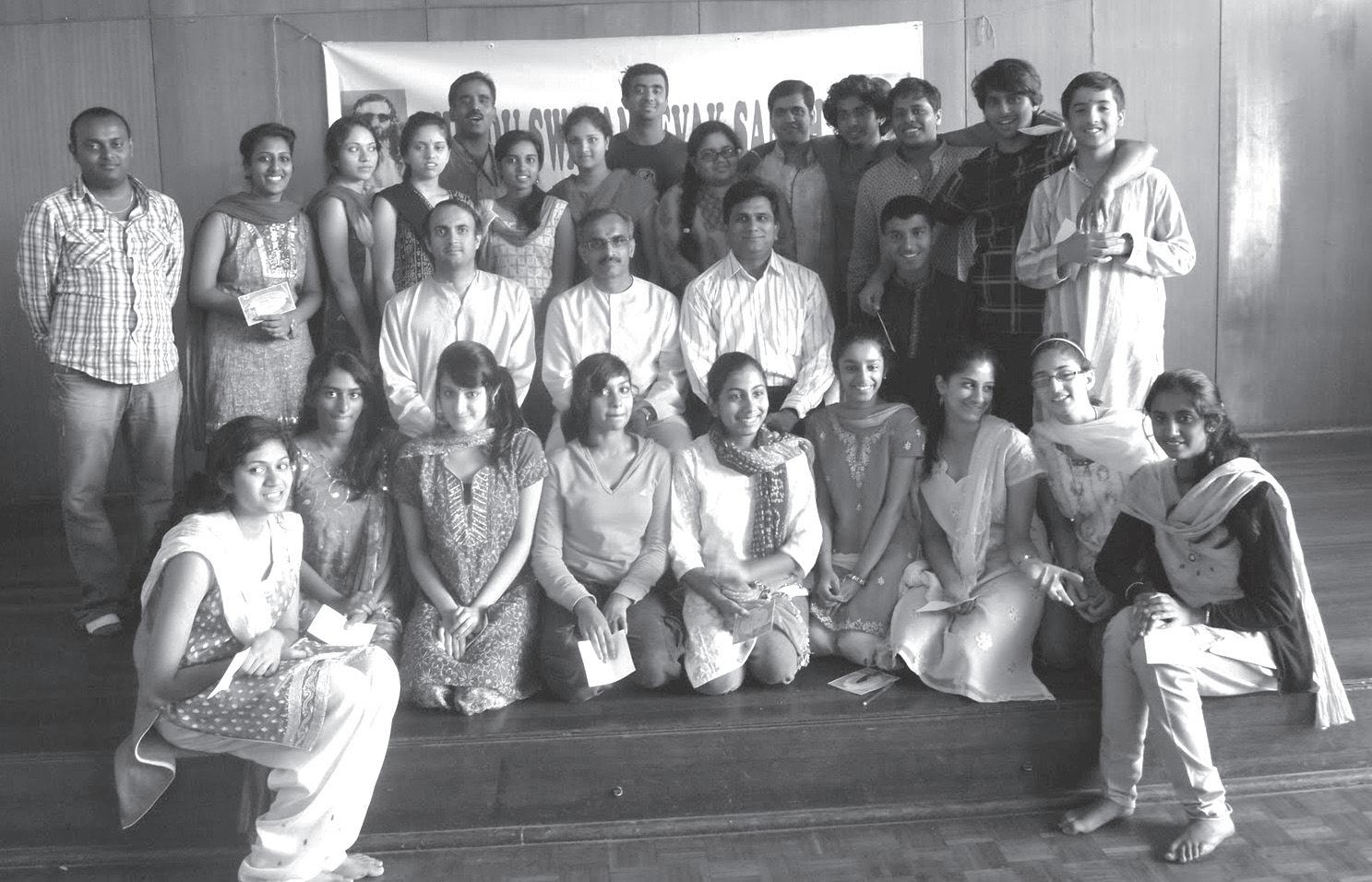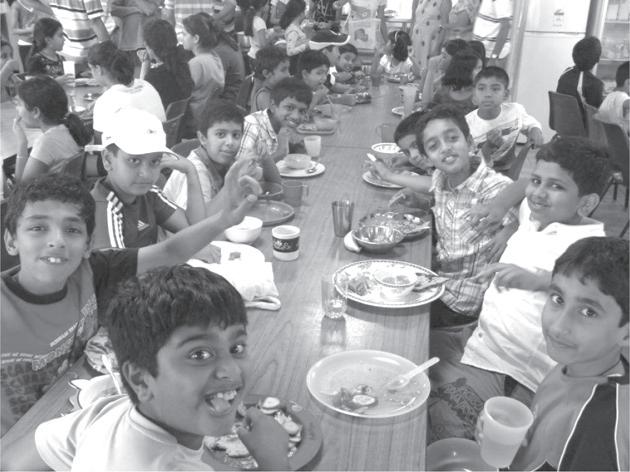
12 minute read
Scripture lessons the fun way
from 2010-01 Sydney (2)
by Indian Link
It was a long weekend of fun.
Nearly 60 kids got together in late January to attend the annual 3-day Children’s Camp organised jointly by Vishwa Hindu Parishad and the Hindu Swayam Sevak Sangh. Held in Heathcote this year, the camp was aimed at sustaining cultural morality amongst the children and enhancing their leadership and soft skills.
The children, all aged between 7 and 14, gathered at 7.30pm in the main hall of the Heathcote Scouts Centre, on Thursday 21 Jan. The camp began with an invocation to Lord Ganesha, the god of good beginnings.
And then the fun and games began, literally. The enthusiastic youth volunteers got the little ones going with their icebreaker games. By the end of the night, as the children relaxed and made friends, they were divided into four groups – named Sathya, Dharma, Shanthi and Prema, after some essential elements in Hindu philosophy.
It was an early start next morning, 6am, as the kids went outdoors for physical exercises. And then onto a fun-packed day
- Yoga basics, Surya Namaskar, traditional games, discussion about various aspects of our culture, skits, story telling, quiz, patriotic songs, arts and crafts, talents exhibition, and much much more. And no, there was no time for Ipods or Playstation portables or Nintendo DSs.
The bush-walks got everyone in touch with nature, and the Holi activity put everyone in an even happier frame of mind. (Unfortunately the camp-fire was cancelled due to extreme weather conditions and a total fire-ban on the Friday).
The children also enjoyed a visit to Sri Venkateshwara Temple at Helensburgh.
Participants were served with delicious vegetarian food, prepared by a group of volunteers. The menu included dishes carefully chosen from both North and South Indian delicacies.
On the last day Sunday, after the bushwalking activity and then showers, the kids performed their skits and exhibited their new skills in front of an invited audience. Some wonderful episodes from the Panchatantra and from the lives of great personalities like Emperor Ashoka, Martin Luther King and Kalpana Chawla, were presented.
Hemant Suryavanshi, Satish Tirumalai and Gopal Chintakindi were the principal co-ordinators for the camp, assisted by a group a self-less volunteers.


The children were managed by a group of about 20 youths, led by Archana Rao, Harini, Pratmesh, Prabhanjan and Vaishnavi.

These youths extensively planned and executed all the physical and educational activities at the camp. Later, they revealed being overwhelmed with the many positive experiences they had experienced whilst managing and inculcating the community spirit amongst the kids. All of them recommitted themselves to be part of this children’s camp next year and expressed a sense of satisfaction for having spent three fruitful days as role-models for these younger kids.
And when it was time to go home, everybody lingered on, as if they wanted the camp to go on longer!
Best Timber Flooring

Showroom: 1/42 Harp Street Belmore NSW 2192 TEL: 02-9787 5630

MOB: 0425-249 877 (Raymond)

And now it’s 2 Grammys for Rahman
INDIANS WENT Jai Ho once again this week when music maestro A.R. Rahman scored a double triumph at the Grammy Awards in Los Angeles, a year after bagging two Oscars for his foot tapping music for Slumdog Millionaire
The composer bagged the best compilation soundtrack for a motion picture and another one for the best motion picture song at the 52nd Annual Grammy Awards.
He won the award with veteran lyricist Gulzar and Tanvi Shah who wrote the Spanish lyrics for it.
“This is insane, god is great again,” a beaming Rahman said after receiving the award at the biggest show in the music world. The other Indian contenders, Zakir Hussain and Amjad Ali Khan, could not manage to win the golden gramophones. “Insane, eh? I never even dreamt about winning all these awards,” Rahman posted on his Twitter page shortly after receiving the award.
Just a year ago, Rahman’s music for Slumdog Millionaire, a screen adaptation of Indian author and diplomat Vikas Swarup’s novel Q & A, had propelled him to the record books as India’s first double Oscar winner.
Besides the Oscars and now the Grammys, the Chennai musician’s composition for the film has also won him other prestigious international awards like the British Academy of Film and Television Arts (BAFTA), Critics Choice Award and the Golden Globe.
“We all are very proud of him. This magical musician has brought more honour to India, his family, fans, friends and his entire team. Such a young man has made his mark on the music map of the world. All of us should put him on our shoulders,” said Gulzar who shares the prestigious award with him.
“I am proud of Rahman as a special friend and composer who made India proud in the world of music. It’s his true dedication towards innovative music and his connection with divine energies. Bravo Rahman!” exclaimed filmmaker Subhash Ghai who roped in the composer for his films Taal, Kisna: The Warrior Poet Yuvvraaj
Director Imtiaz Ali added: “It fills me with pride. Also makes me think if he is getting this much accolade for Jai Ho, wonder what the reaction of the West will be when they discover the rest of Rahman? I’m waiting to see the man go from strength to strength.”
The composer’s sister Reihana said winning awards was “a way of life” for her 44-year-old brother.
“It’s a good start of the year. (Winning awards) is a way of life now since he has won so many,” Reihana told NDTV after her brother won the award.
“When he was going for the Golden Globes last year, he was doubtful about his win and so were we, but after he got that, it has been awards and awards for him, so we were quite sure that he will get the Grammy as well,” she added.
The song was crooned by Sukhvinder Singh, Mahalaxmi Iyer, Vijay Prakash with support from Rahman and Shah. Global honours may have come his way only since Slumdog Millionaire, but the unassuming composer has been contributing to world music for quite a while.
He composed music for The Lord of the Rings theatre production, for instance, as well as for Andrew Lloyd Webber’s Bombay Dreams
His talent first came to the fore with Roja in 1992, and there has been no looking back since for the musician, who has just been awarded the Padma Bhushan, India’s third highest civilian award.
The accolades have not stopped. ***
Indian head for Amnesty
International
AMNESTY INTERNATIONAL has appointed Salil Shetty, an Indian who headed the UN Millennium Campaign, as its next secretary general.
Shetty takes over the job in June 2010, succeeding Irene Khan who stepped down after eight years as Amnesty Secretary General Dec 31, 2009.
Amnesty - the global human rights watchdog - said Shetty, with a strong track record in the non-government and intergovernment sectors, will lead its 50th anniversary expansion plans.
“We are thrilled that Salil will be joining us and leading Amnesty International as we renew our fight to end injustice - campaigning with those imprisoned because of their ideas, those on death row, those being tortured, and those who have their rights denied because they live in poverty,” said Peter Pack, the chair of Amnesty’s International Executive Committee.
“As we approach our 50th anniversary, we have ambitious plans to expand our work, especially in the global south, and Salil has a solid track record in mobilising people, civil society, governments and international organisations in the fight for people’s rights and dignity,” added Pack.
“I feel privileged to be given this amazing opportunity at a time when the world needs human rights for all more than ever before,” said Shetty, who becomes the first Indian to head the human rights body.
Amnesty International, founded in
London in 1961, has more than 2.2 million members and supporters in more than 150
Food security, productivity remain major concerns in
THE SENSE OF COMFORT over India’s food security is somewhat misplaced and both the availability of produce and controlling prices remain challenges needing focussed attention on farm productivity, Prime Minister Manmohan
“Our experience in the past two years has brought to the fore the importance of food security and the need for containing prices,” the prime minister told the first annual conference of chief secretaries
“For some time past, there was a false sense of security that availability of food has ceased to be a concern. Similarly, many felt that we have been able to control prices,” he said in a rather frank assessment
He, accordingly, urged the state governments, too, to focus their energies on farm productivity and said there was great scope for improving the yields of major crops and hoped to see greater efforts in
“Our agricultural productivity still ranks far below the best in the world.”
Drawing comfort from the manner in which India handled the challenges posed by the global slowdown in a much better fashion than many other economies, the prime minister stressed that inclusive growth remained the government’s centre-
“Fast economic growth has little meaning if it does not lead to the well being of the poor and the disadvantaged, of our farmers and workers, of our children, students and women. The benefits of the development process have to percolate to every part of our country.”
He said it was for the bureaucracy to ensure that the numerous welfare programmes of the federal and state governments are implemented in the spirit in which they have been conceived, without roadblocks and leakages, through decentralised governance.
“All this constitutes a huge task that requires dedication, commitment and persistence. I would like to add here that the central government does recognize that there is always room for improvement in these schemes and programmes.”
The prime minister also expressed concern over poor infrastructure in the country and said states that have lagged behind must go that extra mile to remove all the bottlenecks. “Shortages of electricity, poor roads, over-crowded ports, delayed flights, all retard our economic efficiency and damage our international image. States that have relatively better infrastructure attract investment while the others lag behind,” he said. “This is a lesson which all States have to imbibe.”
***
Mumbai belongs to all of India: Chidambaram
SLAMMING THE Shiv Sena for its controversial “Mumbai for Marathis” slogan, Home Minister P. Chidambaram said such a “pernicious” thesis has to be rejected and the city belongs to all of India. “We reject the thesis of Shiv Sena. Mumbai belongs to all of India and all Indians are
Continued on page 30
A Sydney (Hills District) company is looking for an on-site technician

To qualify for an interview, candidate must have the following:
- Valid Australian drivers license


- Vehicle transport to / from work
- Availability to work weekends and after hours
- English fluency in speaking, reading and writing
- Computer literacy
- Training will be provided

Currently we have a part-time position available with the possibility of a full-time role if you prove to be worthy.
If you are looking for a new opportunity with a growing company, please forward your resume with contact details to: sydneyrestorationjob@gmail.com free to live and work in Mumbai,” Chidambaram told reporters. “As a matter of policy, we reject the theses of the Shiv Sena and the MNS (Maharashtra Navnirman Sena). These are pernicious theses and they have to be rejected,” he said.
The home minister said that the Maharashtra government was “competent” to handle the situation in Mumbai after the Shiv Sena Sunday objected to the Rashtriya Swayamsevak Sangh’s (RSS) view that the city is for all Indians.

“If the government of Maharashtra seeks our advice, we will advise them. But I am sure they are competent to manage the situation,” Chidambaram said.
IPL fiasco: Parliamentary panel summons PCB heads
A PARLIAMENTARY PANEL has summoned officials of the Pakistan Cricket Board (PCB) to explain the circumstances under which the country’s players were ignored at the Indian Premier League (IPL) auction last week.
The National Assembly’s Standing Committee on Sports will question PCB chairman Ijaz Butt and Chief Operating Officer (COO) Wasim Bari on the IPL fiasco in which none of the 11 Pakistani players on offer found any takers. This apart, the officials, as also Pakistani team coach Intikhab Alam, will have to explain the 0-3 loss to Australia in the Test series and the 0-5 loss in the just-concluded One-day International series.
The two Twenty20 match ban handed to stand-in captain Shahid Afridi for ball tampering in fifth ODI at Perth will also come in for discussions, with PCB director general Javed Miandad being summoned “to know the reasons and problems which the legendary batsman (Afridi) is facing besides hurdles in PCB”, Online news agency reported.
The standing committee had taken “belligerent notice of Pakistan’s pathetic defeat at the hands of Australia both in Tests and ODI’s besides Pakistani superstars being ignored for the cash rich IPL”, the agency added.
The International Cricket Council (ICC) banned Afridi for two Twenty20 matches. Afridi, who was leading the side in the final ODI in the absence of an injured Mohammad Yousuf, was caught by TV cameras appearing to chew on one side of the white ball, shortly before the umpires changed it at the end of the 45th over. Afridi admitted the charge, after which match referee Ranjan Madugalle slapped the ban.
UN climate panel informed of India’s mitigation efforts
INDIA INFORMED the United Nations Framework Convention on Climate Change (UNFCCC) of its efforts to address global warming by trying to reduce its emissions intensity by 20-25 percent by 2020, but stressed that the agriculture sector would be kept out of this.
In a message sent to the UNFCCC secretariat, the government formally conveyed that India will endeavour to reduce its emissions intensity by 20-25 percent by 2020 in comparison to the 2005 level through domestic mitigation actions, an official release said.
Terming this as India’s contribution to the global efforts to address climate change, the government, however, has clarified that its domestic mitigation actions will be entirely voluntary and will not have a legally binding character.
It also said the mitigation actions will not apply to agriculture sector and the emissions from agriculture sector will be excluded from the assessment of emission intensity.
“The mitigation actions will be taken in accordance with the principles and provisions of the United Nations Framework Convention, which require developing countries like India take these actions in accordance with the principle of common but differentiated responsibility and respective capability. Developed countries, known as Annex I Parties, meanwhile, undertake mitigation commitments with specific quantified targets to reduce their emissions,” the release said.
India “intends to implement its mitigation actions in accordance with the provisions of the relevant national legislation and policies and will elaborate in due course the actions required in various sectors to achieve the overall objective of the emissions intensity reduction,” the release added.
***
Samajwadi Party expels
Amar Singh and Jayaprada
“ET TU BRUTE”. That’s what Amar Singh said after being expelled from the Samajwadi Party (SP) by his one-time mentor Mulayam Singh Yadav who he stressed had not just betrayed him but also “Talibanised” the “primitive” party.
“All I want to say is, Brutus tum bhi. But it has come with a relief,” Amar Singh told IANS in an exclusive interview, recalling Julius Caesar’s dying words on Brutus’ betrayal in the Shakespeare play.
“Har fikr ko dhuwain main udata chala gaya,” he added in a light vein about his predicament, remembering the famous Hindi film song.
The industrialist-politician, who resigned from all party posts a few weeks ago, came out openly against Mulayam Singh and his family.
“I know who had drafted the abuses against me. They called me mad, shameless, scoundrel. The SP leaders were not speaking their own language. I know how it works in the party,” he said shortly after the announcement in Lucknow that he along with actor-MP Jaya Prada were being expelled for indulging in “anti-party” activities.
Asked who he was referring to, Amar Singh said: “Of course Mulayam Singh and his family. He son (Akhilesh), his Yadav cousins.”
Amar Singh said he was suffocated with the “Talibanisation” of the “primitive” SP and that he had attained political nirvana after being expelled.
“I am hurt, but I am feeling relieved. It is like attaining political and social nirvana for which I am thankful to my party leaders.”
Seated in his plush 13th floor office in Kasturba Gandhi Marg in central Delhi, Amar Singh said he was now aiming higher and planning a computer revolution in India’s villages. This was exactly the issue, he said, that led to his rift with the Samajwadi Party.
“Our party is primitive. They are opposing computers and English language. The Talibanisation of the entire thing was suffocating. It (resignation) should have happened earlier,” said the former high profile SP general secretary.
“I will go to rural India with computer revolution and will start it Feb 26 from Azamgarh district and my friend Amitabh Bachchan will inaugurate that,” he said. Did that mean he was creating the ground for a new regional party in Uttar Pradesh? Amar Singh didn’t rule it out but said it was too early to confirm it.
“I will work for separate states of Harit Pradesh, Purvanchal and Bundelkhand. I will work for positive politics,” he said. Amar Singh, who was known as the face of the SP and also the man who attracted the big and the famous to the party, said categorically that he was not warming up to either the Congress, the Nationalist Congress Party (NCP) or the Bahujan Samaj Party (BSP) to look for political alternatives.
“I am not a political animal. I have other things to do for my people.”
The SP’s future as a party opposing the technological revolution would play out for all to see.
“I won’t comment on that. It will sound as if I am bitter after being expelled but the entire nation will see that.”











